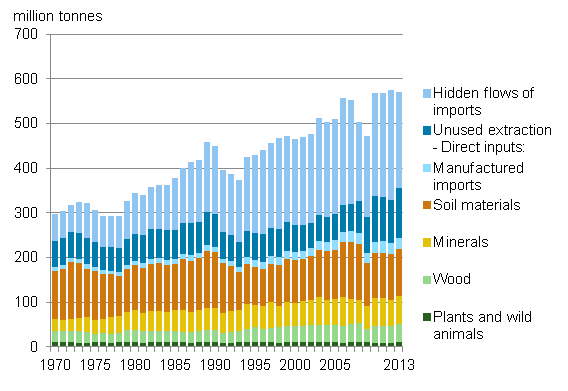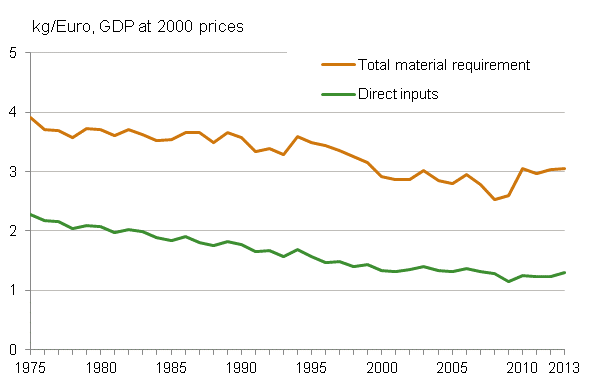Published: 20 November 2014
The economic downturn has not affected the use of natural resources
The material economy did not peter out like the national economy did last year. In 2013, material requirement as direct input in the national economy was 4.7 per cent higher than in the previous year. For example, in agriculture, cereal production grew by as much as 11 per cent, logging in forestry increased by 9 per cent, and altogether more metal ores, industrial minerals and useful stone were extracted from mines than ever before. The use of imported goods remained on level with the previous year. And even though the use of stone, like gravel and crushed stone, in construction fell to the level of the recession year 2009 and even below it, all in all, a similar collapse in the material requirement as seen in the recession of the early 1990s or in 2009 is not visible in Finland at the moment.
Total material requirement by material groups in 1970 to 2013

In 2013, direct material inputs used by the national economy totalled around 244 million tonnes, of which domestic inputs made up 77 per cent. A majority of domestic inputs is produced in the use of minerals, mines and construction minerals. Biotic inputs are estimated to have a share of one-quarter of the weight, including wood, cereal, root vegetables and fodder plants, as well as fish and game.
The material generated in the utilisation of natural resources that is not transferred into input in the economy is called domestic hidden flows and hidden flows of imports. The total domestic and foreign hidden flows are higher than direct inputs, around 326 million tonnes. Of this amount, around 120 million tonnes were generated in Finland, for example as wall rock, logging waste and soils from construction.
Total material requirement rose to over 570 million tonnes in 2013. The use of natural resources calculated per person is relatively high in Finland compared to other EU member countries.
Economy-wide material flow accounts are part of environmental accounts, on which the European Union passed a Regulation in 2011 and the UN gave an international recommendation in 2012.
Material intensity of Finland's economy in 1975 to 2013

Source: Economy-wide material flow accounts 2013, Statistics Finland
Inquiries: Simo Vahvelainen 029 551 3457, Leo Kolttola 029 551 3234, Jukka Muukkonen 029 551 3224, environmental.accounts@stat.fi
Director in charge: Leena Storgårds
Publication in pdf-format (227.2 kB)
- Tables
-
Tables in databases
Pick the data you need into tables, view the data as graphs, or download the data for your use.
Appendix tables
Updated 20.11.2014
Official Statistics of Finland (OSF):
Economy-wide material flow accounts [e-publication].
ISSN=2242-1289. 2013. Helsinki: Statistics Finland [referred: 19.4.2025].
Access method: http://stat.fi/til/kanma/2013/kanma_2013_2014-11-20_tie_001_en.html

